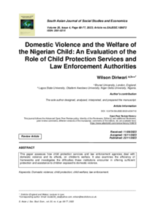Domestic violence is a problem that significantly impacts children making them one of the vulnerable groups affected by this issue. In Nigeria there is growing concern regarding the welfare of children, in relation to violence. This emphasises the role played by Child Protection Services and Law Enforcement Agencies in safeguarding these children [1]. The purpose of this paper is to evaluate how effective Child Protection Services and Law Enforcement Agencies are in addressing violence and its impact on children's welfare. It examines existing approaches and models while suggesting ways to enhance their services. This paper assesses the strategies, resources, and coordination mechanisms employed by Child Protection Services and Law Enforcement Agencies in tackling violence. It specifically focuses on investigating incidents intervening when necessary and providing support to child victims and their families.
Furthermore, it explores the effectiveness of collaboration between Child Protection Services, Law Enforcement Agencies stakeholders such, as the legal system, healthcare providers, and Non-Governmental Organisations (NGOs) in responding to and preventing domestic violence involving children. The paper also examines the obstacles faced by Child Protection Services and Law Enforcement Agencies in Nigeria when it comes to addressing violence, against children. These challenges include norms that discourage violence, limitations in resources, inadequate training, and systemic barriers that hinder an effective response to domestic violence.
This paper aims to contribute to an understanding of how Child Protection Services and Law Enforcement Agencies in Nigeria can combat domestic violence against children. It seeks to provide recommendations, on strengthening these entities as other important stakeholders involved in preventing detecting, responding to, and protecting children from domestic violence

